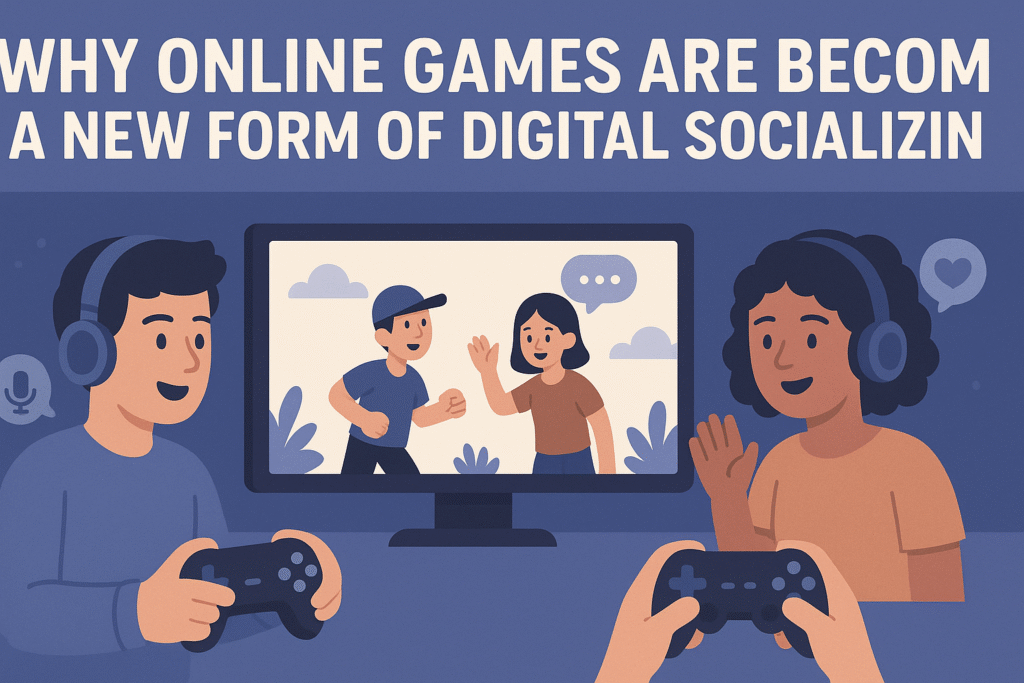Not too long ago, gaming was something people mostly did alone. You’d sit in your room, throw on some headphones, and disappear into another world. But things have changed. Today, especially for younger folks, online games are one of the most common ways to keep in touch, have fun, and actually make new friends.
So, how did we get here? And why is this shift such a big deal?
It’s Not Just About Winning Anymore
Of course, winning still feels good. But these days, it’s not the only reason people log in. What really draws people into online games now is the social side—the laughs, the shared goals, and just having someone to talk to.
Think about how games like Among Us, Fortnite, or Valorant work. They’re not just competitive—they’re interactive. You work with others, joke around, and share real-time experiences. It’s basically like hanging out, just with cool graphics and missions.
And this goes beyond the games themselves. Most of these platforms now come with built-in voice and chat features, so you’re not just playing—you’re talking. You can spend hours chatting about anything, even stuff that has nothing to do with the game.
Even in places like Mongolia, this trend is growing. Sites like 1xbet Mongolia let people engage in sports and gaming communities together. It adds a whole new social layer to what used to be a solo experience.
Watching Games Is Part of the Fun Too
Here’s something wild: tons of people now spend more time watching games than playing them. Livestreaming platforms like Twitch or YouTube Gaming pull in millions of viewers every day. And it’s not just about watching someone beat a level—it’s about feeling like you’re part of the moment with everyone else.
Watching your favorite streamer is kind of like hanging out with a friend. You can comment, react, and connect with other fans in the chat. It turns passive watching into a group activity.
This is also true in the sports world. The evolution of soccer apps shows how fans stay connected through digital tools, fantasy leagues, and live chats—making sports more interactive than ever before.
COVID Changed Everything
When the pandemic hit, and schools and hangouts shut down, online games filled a huge gap. Millions of teens and young adults turned to gaming to stay in touch. And it wasn’t just for fun—it was one of the only ways to feel connected.
According to the Entertainment Software Association, 77% of gamers said playing online helped them stay close to friends during lockdowns. Titles like Animal Crossing: New Horizons became huge because they created a peaceful, social space where people could visit each other’s islands and chill together.
It’s not hard to see why gaming became a go-to. When the world outside felt uncertain, these digital spaces became something familiar, even comforting.
For Some, It’s a Social Lifeline
Let’s be real—talking to people in person can be tough sometimes. That’s why, for many, especially those with social anxiety or who feel isolated, gaming became a social lifeline.
In a game, no one cares how you look. You’re not expected to talk right away or say something perfect. You can ease into conversations, and friendships build over time—usually while working on goals together.
Whether you’re teaming up to defeat a boss, win a match, or build something cool, that shared purpose makes it easier to connect with others. It’s not forced, it’s natural—and that’s what makes it special.
It’s Not Perfect, But It Can Be Great
Of course, gaming isn’t always sunshine and rainbows. Toxic players, too much screen time, or feeling burned out are all real issues. But just like anything else, it’s about balance.
Here are a few quick tips to keep gaming fun and healthy:
- Take regular breaks. Get up, stretch, and look away from the screen now and then.
- Mute or block anyone toxic. Life’s too short for negative energy.
- Don’t forget real life. Mix in some offline time with family or friends.
- Pick games that bring people together, not ones that leave you frustrated.
Final Thoughts: More Than Just a Hobby
Next time someone rolls their eyes when you mention gaming, remind them—it’s not just about winning or escaping. It’s about connecting, laughing, and making memories with people you might not have met otherwise.
In a world that’s always online, online games have become something pretty amazing: a place to belong, even when you’re miles apart.




